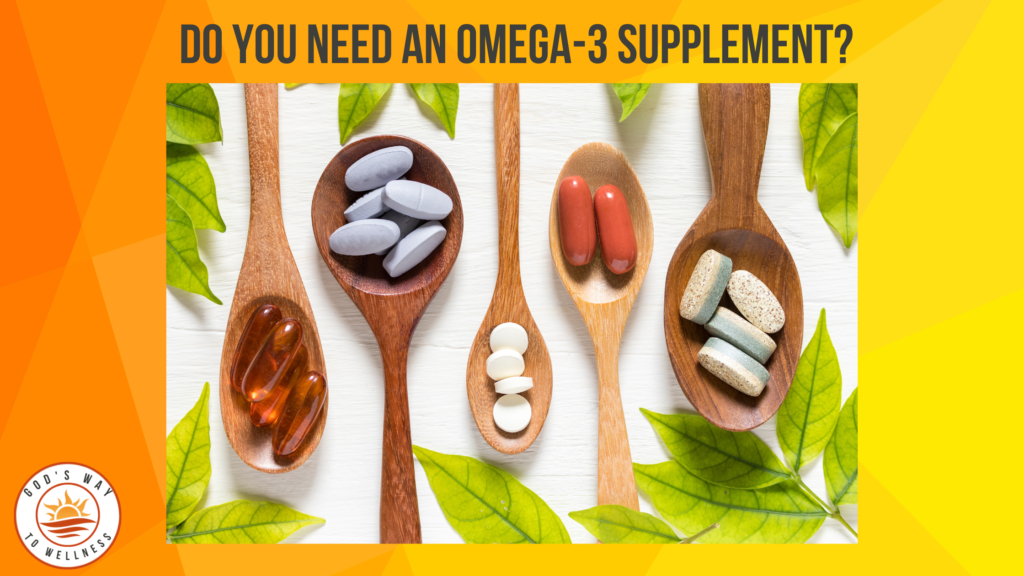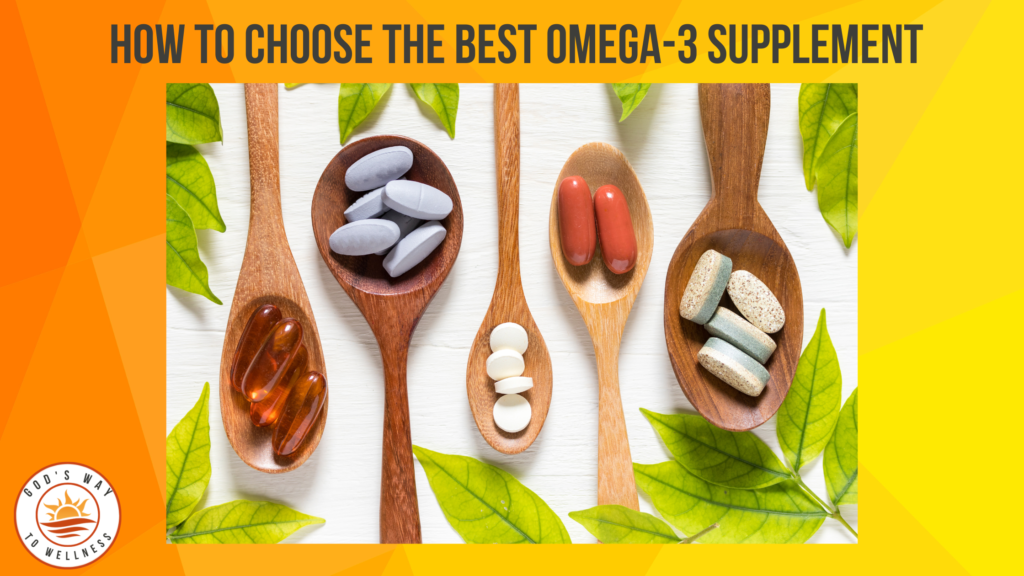Do you wander through the vitamins and supplements aisles in the drugstore or big box store wondering “what supplements should I take?” I know! There are so many choices.
Food made by God is the best source of the nutrients essential to the health of our bodies. But often we cannot get all our nutrients from food.
So, here is another recommendation of a must-have supplement from Dr. Rhonda Patrick, a cell biologist and co-founder of FoundMyFitness.
Do you need an omega-3 supplement? Let’s dig in to find out more about fish oil and omega-3 supplements.
What are omega-3 fatty acids?
Fatty acids are the building blocks of the fat in our bodies, and in the food we eat. Omega-3 fatty acids are essential because the body cannot manufacture them. The only source of them is from our diet.
There are three main types of omega-3 fatty acids.
Docosahexaenoic acid (DHA)
Fish and seafood are the principal sources of DHA. The retina of the eye, brain, and sperm cells have high levels of DHA. It is also vital for fetal brain development.
Eicosapentaenoic acid (EPA)
The primary sources of EPA are fish and seafood.
Alpha-linolenic acid (ALA)
Plant sources such as nuts and seeds contain ALA. However, the liver must convert it to DHA or EPA. Only a small amount of ALA is converted to the active forms.
Importance of omega-3s
Omega-3s are vital for many systems in the body, including the heart, blood vessels, lungs, immune system, and endocrine system. They play a crucial role in maintaining cell membrane integrity and serve as an energy source.
Benefits of an adequate intake of omega-3 include:
- Decreased risk of depression and anxiety
- Reduced risk of macular degeneration
- Improved heart health
- Decreased risk of memory loss and Alzheimer’s disease
- Improved bone strength
- Reduced symptoms of rheumatoid arthritis
- Promote a healthy pregnancy and support fetal brain growth
Foods rich in omega-3s
Fatty fish such as herring, salmon, mackerel, anchovies, and sardines contain the highest levels of DHA and EPA. You can find ALA in chia seeds, flaxseeds, walnuts, and soybeans.

Why do you need an omega-3 supplement?
Unless you have a lot of fish in your diet, it’s very hard to get an adequate omega-3 level to support wellness without relying on a supplement.
How much fish is enough? The American Heart Association recommends eating two 3-ounce servings of fatty fish per week.
Dosage of omega-3 fatty acids
There is no specific recommendation for the daily value (DV) of an omega-3 or fish oil supplement. Your age, health status, activity level, weight, and intake of omega-3 containing foods all determine the dosage.
However, the recommended daily intake (RDI) of combined DHA and EPA from fish and seafood is 250–500 mg.
When purchasing a supplement, consider the amount of DHA and EPA, rather than the amount of fish oil. Although cheaper brands may contain more fish oil, they lack enough DHA and EPA to meet daily needs, so you must take more.
It is best to take an omega-3 supplement with a meal containing fat to improve absorption.
Sources of omega-3 supplements
There are several sources with minor differences—fish oil, krill oil, algal oil, and cod liver oil. Avoid what you might be allergic to and choose algal oil if you prefer a plant-based source.

Final words
Do you need an omega-3 supplement? Yes, unless you eat a lot of fish and seafood.
Here is a link to an excellent reference on the amount of DHA+EPA in fish and seafood. Save it and print it out for future reference.
How do you choose the best omega-3 supplement? Read more here.
If you missed them, catch up on the other two must-have supplements, magnesium and vitamin D.
Any information on this Website is provided for educational purposes only and is not intended as a substitute for the advice provided by a healthcare professional. You should not use the information on this Website for diagnosing or treating a health problem or disease or prescribing any medication or other treatment. You should always speak with a healthcare professional before taking any medication or nutritional, herbal or homeopathic supplement, or adopting any treatment for a health problem. If you have or suspect that you have a medical problem, promptly contact a healthcare professional.




Reading this post again more carefully, I do think I need to take a supplement for omega 3.
Although I enjoy salmon and tuna fish, I do not have much fish in my daily or even weekly diet . According to this blog post , it would be highly beneficial to my health in many areas. Macular degeneration , bone strength, help with memory loss ,and heart health jump out at me .Those are areas of some concern for me .
As always, thank you Sue for bringing this awareness of Omega 3 to me.
Thanks for reading, Mare. I am glad you found the information valuable. Yes, this supplement is a must for most people. The post from 4/19/24 gives some things to look for in an omega-3 supplement. They are readily available at many stores, but read the labels carefully to make sure you know what you are getting.